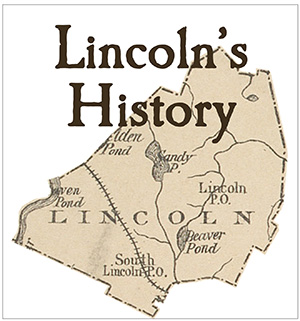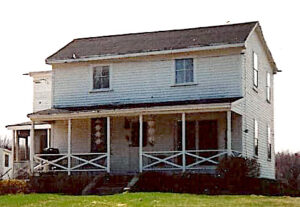By Gus Browne
It’s no surprise that Lincoln’s history as a European settlement began with farming on Thomas Flint’s land in the mid-1600s — land that the Flint family still owns and farms. Agriculture was the lifeblood of the community for 300 years.
How did farming families do it? Not easily. A sample day for Joseph Cotoni Sr., whose farm was on Mill Street where Oakdale Lane is now, began at 3 a.m. in the 1940s when he and son Joe Jr. (known best as the proprietor of Joey’s Auto Repair on Lincoln Road and then Concord Road) drove their truck around town collecting food scraps from the in-ground receptacles beside residents’ back doors as food for their 500 pigs and countless chickens.
This trip was followed by farmyard chores, feeding pigs and chickens, and cleaning out the mess that well-fed pigs and chickens make. Then it was time to shower and change clothes for Joe Sr. to drive a school bus route, and for Joe Jr. to walk up Mill Street to North Great Road (a/k/a Route 2A) to get on the school bus — a long walk because for years the school bus did not go down Mill Street.
After the school bus run, Joe Sr. would return to the farm for a day’s work until it was time to get back on the school bus to deliver students from the school to their homes. For Joe Jr., it was a school day like any other, ending with a bus trip back to the top of Mill Street and then a walk home. At this point, Joe Sr. and Jr. would change clothes again, and at 4 p.m., load the truck with crates of produce and baskets of tomatoes for a drive into Boston’s Haymarket, where they would sell it all to wholesalers – and pick up outdated produce to take back to Lincoln for the pigs and chickens. The trip was even longer when they had to stop in Everett to pick up more crates and baskets to bring back to the farm.
After the trip home, there was dinner to eat (thanks to the wonderful cooking of Mrs. Santa Cotoni, whose first name appropriately meant “Saint”) and afterward for Joe Jr., homework for the next school day. And then to bed, to get up at 3 a.m. and repeat the day all over.
Makes your day look a little better, doesn’t it… unless you’re a farmer, in which case I’ve just described your day here.
Photos of Joe Cotoni Sr. and his parents who started farming here in 1901 can be found in Images of America: Lincoln, pp. 62-63, available from the Lincoln Historical Society.
“Lincoln’s History” is an occasional column by members of the Lincoln Historical Society.


Great story — well written!
How well I remember Mr. Cotoni trudging the rather long (uphill!) walk to our house on Weston Road, hauling the in-ground container from the hole near our back door, dumping the garbage into his bucket and then trudging back down to his truck. We were vaguely aware of the pig farm, but like so many people, basically clueless about the “away” where we were throwing things. Not to mention the lives that so many of our fellow Lincolnians lived on the edges of our own limited, privileged view …Thanks, Gus.
Loved this story. They were still collecting garbage for the pigs when I first moved here in 1967. It was a real step backward from a recycling point of you when we had to start putting our garbage in with our trash. We soon started composting ours in the backyard, except for meat scraps, as many Lincoln people still do.
Wonderful story. I grew up on a farm in Vermont; it brings back lots of memories.
Thank you for sharing the story of the Cotoni family. This is indeed an important of our history and community life. Well done, Gus and LHS.
Love this piece Gus! Maureen
Thanks, Gus. Wonderful story. Farming here is our heritage. I remember Quincy Adams, our Conservation Commission Chair for so long, stating the vision for the town buying farmlands when they came on the market and renting it out to farmers so that people in current and future years would feel and know Lincoln’s ties to farming. And we loved our connection to the Blue Heron Organic Farm.
Janet Boynton made a wonderful video of the history of farming in Lincoln, interviewing all the farming families.
And we remember Joey Cotoni as one of the kindest and most capable of people.